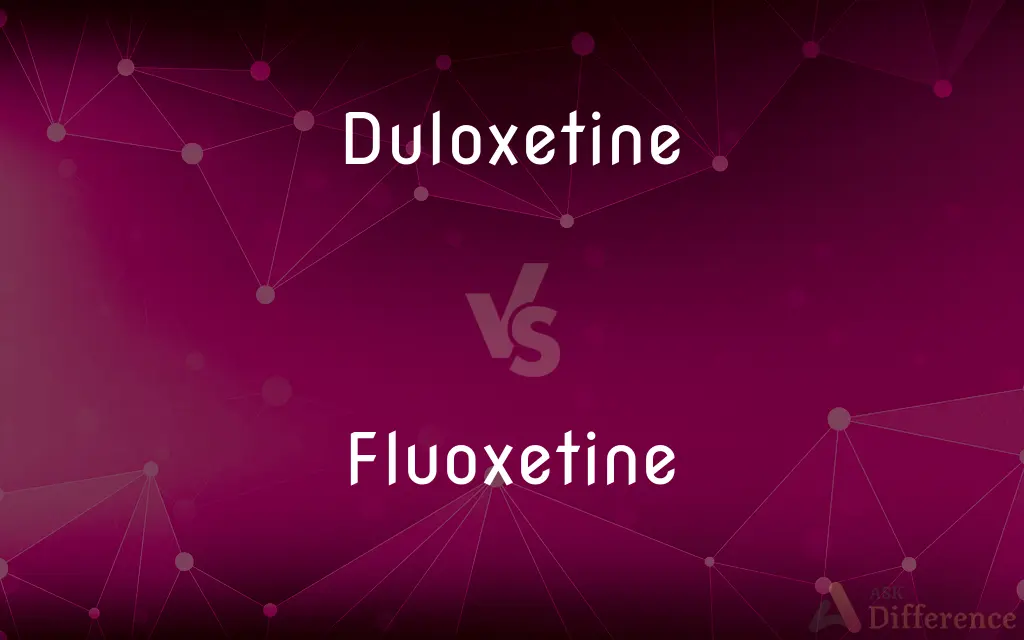Duloxetine vs. Fluoxetine — What's the Difference?
Edited by Tayyaba Rehman — By Fiza Rafique — Published on October 25, 2023
Duloxetine is an SNRI used primarily for depression and neuropathic pain, while Fluoxetine is an SSRI mainly prescribed for depression and OCD.

Difference Between Duloxetine and Fluoxetine
Table of Contents
ADVERTISEMENT
Key Differences
Duloxetine and Fluoxetine both belong to the class of antidepressants, but they function differently and are used for slightly varied purposes.
Duloxetine is a serotonin-norepinephrine reuptake inhibitor (SNRI), meaning it affects both serotonin and norepinephrine in the brain. This dual action can make it particularly useful for treating not only major depressive disorder but also neuropathic pain, including diabetic peripheral neuropathy. On the other hand, Fluoxetine is a selective serotonin reuptake inhibitor (SSRI), which primarily affects serotonin levels in the brain. Fluoxetine is widely recognized for its efficacy in treating major depressive disorder, obsessive-compulsive disorder (OCD), and panic attacks.
While both Duloxetine and Fluoxetine can treat depression, their different mechanisms might make one more suitable than the other depending on the patient's specific symptoms.
Additionally, side effects and drug interactions may vary between the two, thus requiring a healthcare professional's assessment to determine the best fit for an individual.
Comparison Chart
Class of Drug
Serotonin-Norepinephrine Reuptake Inhibitor (SNRI)
Selective Serotonin Reuptake Inhibitor (SSRI)
ADVERTISEMENT
Primary Uses
Depression, neuropathic pain
Depression, OCD, panic attacks
Mechanism of Action
Affects both serotonin and norepinephrine in the brain
Primarily affects serotonin levels in the brain
Notable Side Effects
Nausea, dry mouth, drowsiness
Nausea, insomnia, nervousness
Onset of Action
May take several weeks
Typically takes a few weeks
Compare with Definitions
Duloxetine
An antidepressant of the SNRI class.
The doctor prescribed Duloxetine to help with her neuropathic pain.
Fluoxetine
Known by the brand name Prozac.
Prozac, a popular medication for depression, is a brand of Fluoxetine.
Duloxetine
Effective for neuropathic pain management.
Patients with diabetic neuropathy often benefit from Duloxetine.
Fluoxetine
An SSRI class antidepressant.
Fluoxetine is commonly prescribed to treat depression.
Duloxetine
Impacts both serotonin and norepinephrine neurotransmitters.
Duloxetine's effect on two neurotransmitters differentiates it from many other antidepressants.
Fluoxetine
Affects serotonin levels in the brain.
The primary action of Fluoxetine is on the serotonin neurotransmitter.
Duloxetine
Sometimes prescribed for generalized anxiety disorder.
In addition to depression, Duloxetine can alleviate symptoms of anxiety.
Fluoxetine
Often used for obsessive-compulsive disorder.
Patients with OCD have found relief with Fluoxetine.
Duloxetine
Used to treat depression and anxiety.
Duloxetine can help stabilize mood in individuals with depression.
Fluoxetine
Can be prescribed for panic disorder.
In certain cases, Fluoxetine helps manage symptoms of panic attacks.
Duloxetine
Duloxetine, sold under the brand name Cymbalta among others, is a medication used to treat major depressive disorder, generalized anxiety disorder, fibromyalgia, and neuropathic pain. It is taken by mouth.Common side effects include dry mouth, nausea, feeling tired, dizziness, agitation, sexual problems, and increased sweating.
Fluoxetine
Fluoxetine, sold under the brand names Prozac and Sarafem among others, is an antidepressant of the selective serotonin reuptake inhibitor (SSRI) class. It is used for the treatment of major depressive disorder, obsessive–compulsive disorder (OCD), bulimia nervosa, panic disorder, and premenstrual dysphoric disorder.
Duloxetine
A drug of the SNRI class, C18H19NOS, used in its hydrochloride form to treat depression, anxiety, fibromyalgia, and diabetic neuropathy.
Fluoxetine
A drug of the SSRI class, C17H18F3NO, used in its hydrochloride form to treat depression, obsessive-compulsive disorder, panic disorder, premenstrual dysphoric disorder, and certain eating disorders.
Duloxetine
(pharmaceutical drug) A drug that functions as an SNRI and is administered orally in the form of its hydrochloride C18H19NOS·HCl especially to treat depression, anxiety, and chronic pain (such as that associated with fibromyalgia and peripheral neuropathy). It is marketed under the trademark Cymbalta.
Fluoxetine
(pharmaceutical drug) A synthetic compound which inhibits the uptake of serotonin in the brain and is taken to treat depression.
Fluoxetine
A selective-serotonin reuptake inhibitor commonly prescribed as an antidepressant (trade name Prozac)
Common Curiosities
Is Fluoxetine the same as Prozac?
Yes, Prozac is a brand name for Fluoxetine.
What is Duloxetine?
Duloxetine is an SNRI antidepressant used primarily for depression and neuropathic pain.
Are Duloxetine and Fluoxetine the same?
No, while both are antidepressants, Duloxetine is an SNRI and Fluoxetine is an SSRI.
Which is better for neuropathic pain, Duloxetine or Fluoxetine?
Duloxetine is more commonly prescribed for neuropathic pain.
What is Fluoxetine?
Fluoxetine is an SSRI antidepressant mainly prescribed for depression and OCD.
Can Duloxetine treat anxiety?
Yes, Duloxetine is sometimes prescribed for generalized anxiety disorder.
How do the side effects differ between Duloxetine and Fluoxetine?
Both can cause nausea, but Duloxetine might cause drowsiness, while Fluoxetine can lead to insomnia.
Share Your Discovery

Previous Comparison
Tandoor vs. Oven
Next Comparison
Ordinary Annuity vs. Annuity DueAuthor Spotlight
Written by
Fiza RafiqueFiza Rafique is a skilled content writer at AskDifference.com, where she meticulously refines and enhances written pieces. Drawing from her vast editorial expertise, Fiza ensures clarity, accuracy, and precision in every article. Passionate about language, she continually seeks to elevate the quality of content for readers worldwide.
Edited by
Tayyaba RehmanTayyaba Rehman is a distinguished writer, currently serving as a primary contributor to askdifference.com. As a researcher in semantics and etymology, Tayyaba's passion for the complexity of languages and their distinctions has found a perfect home on the platform. Tayyaba delves into the intricacies of language, distinguishing between commonly confused words and phrases, thereby providing clarity for readers worldwide.














































